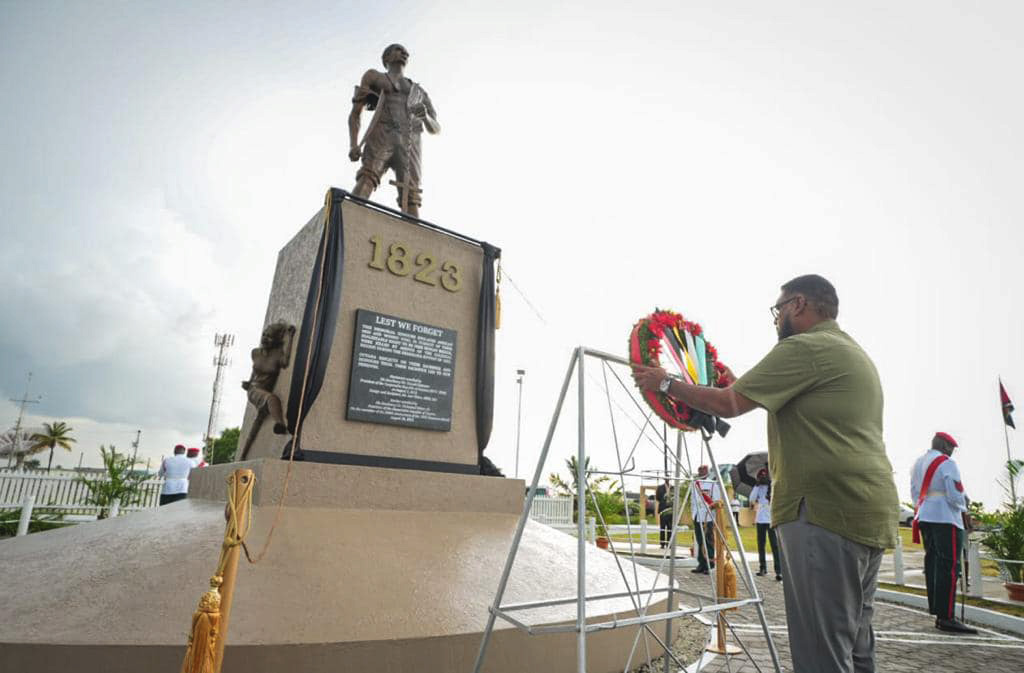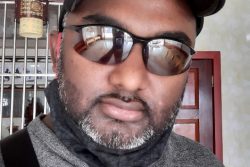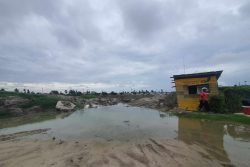In commemorating the bicentennial anniversary of the 1823 Demerara slave uprising on Friday at the monument site opposite the Georgetown Seawall, President Irfaan Ali said that the protection and preservation of democracy must be a shield to safeguard Guyana’s freedom – a freedom that must never come under threat again.
Noting that democracy is the vessel through which the voice of the people finds expression, he said, “The seeds of freedom flourish in the fertile soils of democracy, nurtured by respect for human rights and civil liberties… In turn, the tree of freedom provides shade to democracy, supporting an environment in which diverse perspectives can thrive, dissent can be voiced without fear, and the people’s choices are respected.”
His statement appeared to be a reference to the attempt to rig the 2020 general elections.

As Guyana commemorates the bicentennial anniversary of “one of the darkest and bloodiest events in our people’s quest for freedom” Ali stressed, “let us be resolute in ensuring that we strengthen our democracy and our nation’s development so that our people’s freedom can never, in our lifetime or beyond, be ever again threatened.”
He said the anniversary is a solemn occasion, a sombre reminder that the nation’s history involved centuries of heroic resistance and rebellion against the atrocities of colonial rule.
“We gather here today to commemorate the sacrifices of those slaughtered during the Demerara Revolt of 1823. The callous, cruel, cold-blooded killings of enslaved Africans and the subsequent hangings and beheadings that followed the revolt, stand as haunting reminders of the depths of inhumanity that confronted our African ancestors. It also recalls the huge price paid for our eventual freedom.”
The revolt witnessed great restraint on the part of the enslaved Africans, Ali said, adding that Guyanese historian Dr. Winston Mc Gowan noted that the most remarkable feature of the course of the rebellion was that the enslaved hardly offered personal violence to anyone, especially where they met no resistance. They had the opportunity, especially during the initial two days of the revolt, to kill most of the white personnel on the plantations, if this had been their desire or intention. Instead, they demonstrated a remarkable degree of restraint, self-control and humaneness, for the most part merely seizing them and placing them in stocks without harming them.
This restraint, however, attracted a swift, brutal and deadly response from the colonial authorities. A formidable military force was assembled and unleashed upon those involved in the revolt. The revolt turned into a bloodbath, he noted.
He said that the sacrifice of the martyrs of the Demerara revolt was not in vain but that instead, the revolt helped tip the scales of history in favour of freedom adding that the echoes of the revolt and its brutal suppression reached the British Parliament which triggered reforms which eventually led to, first, apprenticeship and then to the formal abolition of slavery in 1838.
Ali stated that the Demerara Uprising “is part of our history, who we are as Guyanese, who we are as a nation, this history is part of all of us” – the history of a free and independent Guyana. “The sacrifices of those who fell during the revolt contributed to our eventual liberation first from slavery and thence from colonial rule”, he declared.
Monument
Ali added, “This monument must not be misused or abused by activities which take place in and around it. This monument stands as a memorial to those who gave their lives for our freedom and therefore the grounds on which it is situated are considered as hallowed.”
He then said that a “grateful nation” must never forget those who paid the ultimate sacrifice in the pursuit of freedom. “Today we salute the indomitable spirit of those who dared to lift the forbidden banner of freedom.”
“Their struggles and sacrifices paved the path towards freedom. That freedom was not a privilege that was handed down but which was earned through the blood, sweat, and exertions of our ancestors. It is a freedom we must never take for granted and which we must zealously guard from the enemies within and outside of our borders”, he stated.
He said that “With reverence and with eternal gratitude, we honour the martyrs of the Demerara Slave Revolt. They lit the torch that illuminated the path of our freedom. Their legacy must and can only be the preservation of freedom. They raised the banner of freedom; we must carry it forward.”
In closing, Ali recommitted himself and the government and “if I dare say every Guyanese” to the task of living what freedom means.







